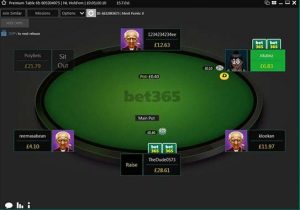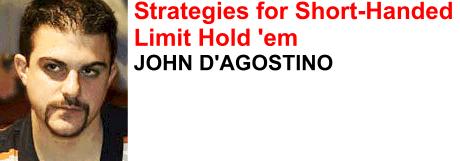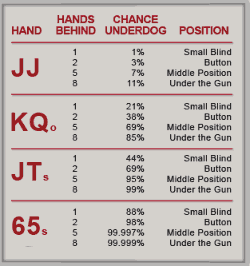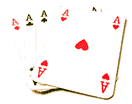 By Mike Caro
By Mike Caro
Sometimes we get so involved in thinking about deeper and deeper poker strategy that we forget to refresh our memories about some of the most powerful, basic, and profitable concepts. One of those topics is poker seating. I believe the concept is so important that almost any skillful player who is neglecting this aspect of poker can expect to see profits increase by at least half by faithfully acting on this powerful poker truth. Here’s the script for my audio lecture…
I teach that choosing the right seat in a poker game is one of the most important factors in increasing your profit. I’m right.
You see, there’s no such thing as a lucky seat in poker. Luck is always apparent after the fact, looking in the rear-view mirror. But there’s no rational reason to suspect, in advance, whether you’ll be lucky or unlucky. It’s all random. And that applies to poker seats as well as to poker people.
Looking back, there are hot seats and cold seats; lucky seats and unlucky ones. But before that good luck or bad luck happened, there was no logical reason to suspect that it would. The lucky seat could have turned out unlucky and the unlucky seat could have turned out lucky.
Superstition:
So, when I talk about choosing the right seat, forget about finding a lucky seat. That’s just superstition. And I don’t allow my students to practice superstition at the poker table.
Well, if there’s no way to determine which seat is lucky, why bother thinking about selecting or changing seats at all? A seat is a seat, right?
No, I didn’t say that. I said you can’t determine lucky seats, but you can determine winning seats. You can determine profitable seats.
Here’s the deal. In poker the action happens clockwise, coming from your right, moving to you, and continuing to your left. Visualize the action. Here it comes from your right. Now it’s your turn. Now the action passes to your left. That’s poker.
And, you know what? When you get to act after someone else, you have an advantage. We call this a positional advantage. It means you get to see what another player decides to do first and then you act. It’s always to your advantage when your opponent acts before you do; it’s always to your disadvantage when you act before your opponent does.
That’s important and I’ll repeat it. You always have an advantage when your opponent acts first; you always have a disadvantage when you act first. This concept is so powerful that if you could put a weather satellite up in space and point its camera down on a poker table, you’d see the money mostly flowing ’round and ’round the table in a clockwise direction.
OK, so far, that’s not a big revelation and just knowing it isn’t helpful. So, let’s make it helpful. At first, you might think that a seat doesn’t matter, because positional advantage evens out. After all, for every player who sits nearby to your right – giving you a positional advantage — there’s a player who sits nearby to your left – taking advantage of you. True, so very true.
Which opponents belong where:
But here’s the trick. There are certain types of players you can profit from more than others by using your positional advantage. And those players belong on your right. And there are certain players who harm you less than others, because they don’t make the most of their positional advantage. And those players belong on your left.
Now, there’s a lot more to seating in poker than that, and I could write a huge book about just the nuances of attacking blinds, getting walks when you’re in the blind, sandbagging, and much, much more. And it all fine-tunes our strategy for knowing what seats are best and how to get the most out of the seat you’re in relative to the types of opponents sitting nearby. But we’ll save that for another day and talk about the most profitable seating consideration right now. This is where the gold is buried.
Your main consideration should be to place the loosest and weakest players on your right, because those are the ones who supply the most profit. Many players are always eager to call a single bet, but they think twice about calling a raise. These are typical loose players who lose the most money in poker games. And you’ll get the biggest share of their losses if you sit immediately to their left (so they’re on your right), thus maximizing your positional advantage.
Why it works:
Let’s look at a ludicrously simple example to illustrate this point. Someone has made the first bet. You’ve got a good hand and are playing an aggressive style, which means you raise frequently to earn extra profit. Suppose your loosest opponent is on your left, holding a weak hand, and acts after you. You raise. Now your loose opponent thinks, “Well, I would have called just to see if I could get lucky, but now I’m going to fold, because even I’m not stupid enough to call a raise.” So, assuming you’re going to win this pot, how many bets did you just gain from this loose opponent? None, right. He folded. But now suppose he’s on your right and you act after him. He calls, because it’s just a single bet and that’s the kind of guy he is. Now you raise. It gets back to him and he thinks, “Wow. I shouldn’t have played this garbage, but it’s just one more bet to me now.” So, he calls. Now, how many bets has he put in your pot? Two. And that magic happens only because he was sitting on your right and not on your left.
The one other seating consideration we’re going to learn today is that tight, un-aggressive players belong on your left. They’ll still have a positional advantage against you, but they won’t profit from it very often, because they don’t play many pots. They simply won’t interfere with your strategy as often as other players, so you can afford to have them on your left.
So, today we’ve learned two important keys about seating in poker. You want the loosest opponents on your right and the tightest ones on your left. Of course, you won’t always be able to select or change seats, but you should keep this advice in mind and use it whenever you can. Again. Loose players belong on your right. Tight players belong on your left.
 Two sites we all rate and recommend however are UK’s bet365 Poker (top site on the iPoker network – Europe’s busiest and best) and Bookmaker Poker, a savvy Costa Rica based poker room on the WPN Network.
Two sites we all rate and recommend however are UK’s bet365 Poker (top site on the iPoker network – Europe’s busiest and best) and Bookmaker Poker, a savvy Costa Rica based poker room on the WPN Network.


 If you’re USA-based, like Phil, you can play some great online at Bookmaker Poker or BetOnline Poker.
If you’re USA-based, like Phil, you can play some great online at Bookmaker Poker or BetOnline Poker.






 There really are some good reasons to play poker online…and not many reasons I can think of not to! Certainly the fact it’s been recently deemed “illegal activity” (and right up their with gun running, child molestation and cattle rustling) surely must add to its allure?
There really are some good reasons to play poker online…and not many reasons I can think of not to! Certainly the fact it’s been recently deemed “illegal activity” (and right up their with gun running, child molestation and cattle rustling) surely must add to its allure? We’ve all seen the big poker tournaments on TV where famous players battle against Joe Schmuck for the big money at the WSOP & the WPT surrounded by TV cameras. Well, you can get into poker tournament action in the privacy of your own home and for very small stakes. You can get a whole lot of entertainment for as little as $1.
We’ve all seen the big poker tournaments on TV where famous players battle against Joe Schmuck for the big money at the WSOP & the WPT surrounded by TV cameras. Well, you can get into poker tournament action in the privacy of your own home and for very small stakes. You can get a whole lot of entertainment for as little as $1.

